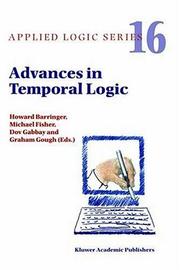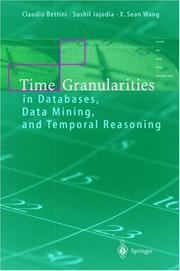| Listing 1 - 2 of 2 |
Sort by
|

ISBN: 0792361490 9048153891 9401595860 9780792361497 Year: 2000 Volume: 16 Publisher: Dordrecht : Kluwer academic,
Abstract | Keywords | Export | Availability | Bookmark
 Loading...
Loading...Choose an application
- Reference Manager
- EndNote
- RefWorks (Direct export to RefWorks)
Time is a fascinating subject and has long since captured mankind's imagination, from the ancients to modern man, both adult and child alike. It has been studied across a wide range of disciplines, from the natural sciences to philosophy and logic. Today, thirty plus years since Prior's work in laying out foundations for temporal logic, and two decades on from Pnueli's seminal work applying of temporal logic in specification and verification of computer programs, temporal logic has a strong and thriving international research community within the broad disciplines of computer science and artificial intelligence. Areas of activity include, but are certainly not restricted to: Pure Temporal Logic, e. g. temporal systems, proof theory, model theory, expressiveness and complexity issues, algebraic properties, application of game theory; Specification and Verification, e. g. of reactive systems, ofreal-time components, of user interaction, of hardware systems, techniques and tools for verification, execution and prototyping methods; Temporal Databases, e. g. temporal representation, temporal query ing, granularity of time, update mechanisms, active temporal data bases, hypothetical reasoning; Temporal Aspects in AI, e. g. modelling temporal phenomena, in terval temporal calculi, temporal nonmonotonicity, interaction of temporal reasoning with action/knowledge/belief logics, temporal planning; Tense and Aspect in Natural Language, e. g. models, ontologies, temporal quantifiers, connectives, prepositions, processing tempo ral statements; Temporal Theorem Proving, e. g. translation methods, clausal and non-clausal resolution, tableaux, automata-theoretic approaches, tools and practical systems.
Computer logic --- Temporal databases --- Congresses --- Mathematical logic. --- Logic. --- Artificial intelligence. --- Data structures (Computer science). --- Mathematical Logic and Foundations. --- Artificial Intelligence. --- Data Structures and Information Theory. --- Information structures (Computer science) --- Structures, Data (Computer science) --- Structures, Information (Computer science) --- Electronic data processing --- File organization (Computer science) --- Abstract data types (Computer science) --- AI (Artificial intelligence) --- Artificial thinking --- Electronic brains --- Intellectronics --- Intelligence, Artificial --- Intelligent machines --- Machine intelligence --- Thinking, Artificial --- Bionics --- Cognitive science --- Digital computer simulation --- Logic machines --- Machine theory --- Self-organizing systems --- Simulation methods --- Fifth generation computers --- Neural computers --- Argumentation --- Deduction (Logic) --- Deductive logic --- Dialectic (Logic) --- Logic, Deductive --- Intellect --- Philosophy --- Psychology --- Science --- Reasoning --- Thought and thinking --- Algebra of logic --- Logic, Universal --- Mathematical logic --- Symbolic and mathematical logic --- Symbolic logic --- Mathematics --- Algebra, Abstract --- Metamathematics --- Set theory --- Syllogism --- Methodology --- Computer logic - Congresses --- Temporal databases - Congresses.

ISBN: 3540669973 3642086349 3662042282 Year: 2000 Publisher: Berlin ; New York : Springer,
Abstract | Keywords | Export | Availability | Bookmark
 Loading...
Loading...Choose an application
- Reference Manager
- EndNote
- RefWorks (Direct export to RefWorks)
Calendar units, such as months and days, clock units, such as hours and seconds, and specialized units, such as business days and academic years, play a major role in a wide range of information system applications. System support for reasoning about these units, called granularities in this book, is important for the efficient design, use, and implementation of such applications. The book deals with several aspects of temporal information and provides a unifying model for granularities. It is intended for computer scientists and engineers who are interested in the formal models and technical development of specific issues. Practitioners can learn about critical aspects that must be taken into account when designing and implementing databases supporting temporal information. Lecturers may find this book useful for an advanced course on databases. Moreover, any graduate student working on time representation and reasoning, either in data or knowledge bases, should definitely read it.
Database management. --- Temporal databases. --- Data mining. --- Bases de données --- Bases de données spatio-temporelles --- Exploration de données (Informatique) --- Gestion --- Geografie --- Geografische Informatie Systemen --- Databanken. --- Bases de données --- Bases de données spatio-temporelles --- Exploration de données (Informatique) --- Data structures (Computer science). --- Application software. --- Computer logic. --- Computer programming. --- Data Structures and Information Theory. --- Database Management. --- Information Systems Applications (incl. Internet). --- Logics and Meanings of Programs. --- Programming Techniques. --- Computers --- Electronic computer programming --- Electronic data processing --- Electronic digital computers --- Programming (Electronic computers) --- Coding theory --- Computer science logic --- Logic, Symbolic and mathematical --- Application computer programs --- Application computer software --- Applications software --- Apps (Computer software) --- Computer software --- Data base management --- Data services (Database management) --- Database management services --- DBMS (Computer science) --- Generalized data management systems --- Services, Database management --- Systems, Database management --- Systems, Generalized database management --- Information structures (Computer science) --- Structures, Data (Computer science) --- Structures, Information (Computer science) --- File organization (Computer science) --- Abstract data types (Computer science) --- Programming
| Listing 1 - 2 of 2 |
Sort by
|

 Search
Search Feedback
Feedback About UniCat
About UniCat  Help
Help News
News